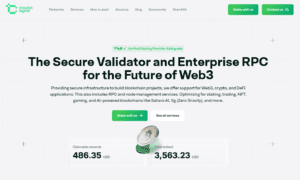In an era where artificial intelligence (AI) is reshaping industries, optimizing the infrastructure that supports AI workflows has become a critical challenge. A groundbreaking research paper by Pavan Srikanth Patchamatla, titled “Optimizing Kubernetes-based Multi-Tenant Container Environments in OpenStack for Scalable AI Workflows”, has recently been recognized with the Innovation in Technological Advancement Award by the International Journal of Advanced Research in Education and Technology (IJARETY). This research presents a novel approach to enhancing cloud computing for AI, making it more scalable, efficient, and cost-effective.
Bridging AI and Cloud Computing
AI applications demand vast computational power, often requiring high-performance cloud environments to process large datasets and train complex models. Traditional cloud infrastructures face challenges such as resource contention, security concerns, and scalability limitations, particularly in multi-tenant environments where multiple AI workloads run simultaneously.
This award-winning study introduces an innovative framework that integrates Kubernetes—the leading container orchestration system—with OpenStack, a widely used open-source cloud platform. By doing so, it effectively balances performance, scalability, and cost-efficiency while addressing key limitations of traditional cloud environments.
Key Contributions of the Research
The study’s contributions extend across multiple domains, including cloud computing, AI optimization, and network security. One of its major highlights is the development of a novel framework for hybrid cloud AI. The research demonstrates how integrating Kubernetes with OpenStack can optimize resource allocation, improving efficiency in handling AI workloads.
Another significant contribution is its impact on scalability for large AI models. Through detailed benchmarking, the study shows that containerized environments outperform traditional virtual machines (VMs) in AI deployment, offering faster boot times and better resource utilization. This makes it an ideal approach for organizations managing large-scale AI workflows.
The research also enhances security in multi-tenant setups. The proposed framework implements advanced Kubernetes namespaces and OpenStack Neutron overlays, ensuring secure isolation of workloads across different AI applications. This strengthens data protection while maintaining performance efficiency.
Furthermore, the study introduces cost-effective AI deployment strategies. By leveraging GPU sharing, serverless computing, and automation tools like Terraform and Ansible, it provides a roadmap for reducing cloud infrastructure costs while maintaining high performance. These innovations help businesses and researchers maximize their cloud investments while ensuring scalability and security.
The Significance of the Award
The Innovation in Technological Advancement Award is presented annually to research that significantly impacts technological progress. This study stood out among a competitive pool of submissions, demonstrating exceptional creativity, interdisciplinary excellence, and real-world applicability.
According to the editorial board of IJARETY, the research was selected for its ability to “address critical technological challenges with creativity and precision, providing practical solutions that can be implemented in both academic and industry settings.” The study is expected to influence the future of AI workflow deployment, inspiring new advancements in hybrid and multi-cloud architectures.
Impact on Industry and Future Research
This research has far-reaching implications for businesses, cloud service providers, and AI developers looking to optimize their computing environments. Enterprises dealing with large-scale AI workloads can adopt the proposed framework to enhance performance, minimize operational costs, and improve security.
Moving forward, the study paves the way for further exploration into advanced GPU scheduling, serverless AI processing, and the integration of OpenStack tools like Magnum for enhanced container orchestration. As AI continues to push the boundaries of computing, innovative approaches like this will be instrumental in shaping the future of cloud-based AI infrastructures.
Final Thoughts
The recognition of this research with the Innovation in Technological Advancement Award underscores its importance in the evolving landscape of AI and cloud computing. By addressing key challenges in multi-tenant AI workflow management, it provides a blueprint for scalable, efficient, and secure cloud environments. As industries increasingly rely on AI for decision-making, automation, and predictive analysis, adopting optimized cloud strategies like those proposed in this study will be crucial for staying ahead in the digital revolution.
For organizations and researchers looking to implement these advancements, the full study is available in Volume 5, Issue 3 (May-June 2018) of IJARETY. The future of AI is in the cloud, and with innovations like this, it’s getting smarter, faster, and more efficient than ever before.































